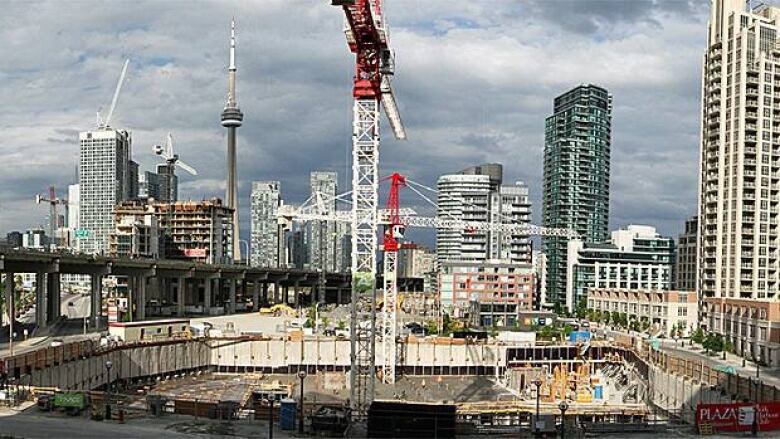Condo-rich Toronto, Vancouver face 15% price decline

The housing markets in Toronto and Vancouver are likely to pull back by about 15 per cent in the next two to three years, TD Bank economists Derek Burleton and Leslie Preston said in a report published Monday.
Canada's two largest housing markets draw a disproportionate amount of attention, and while they have numerous differences, they share a predilection for condominiums, the authors said.
"The most striking similarity is the fact that both markets have been driven largely by condo activity," the bank wrote.
Condo boom
Over the past decade, almost three-quarters of new housing units in Vancouver have been condos. That percentage drops slightly to almost two-thirds in Toronto, but both are still well above the ratios in other Canadian markets.
Over the past 12 months, however, the figure has increased to 80 per cent in Vancouver and 74 per cent in Toronto. That's a high ratio, and makes the real estate markets in both cities vulnerable to any sort of slowdown in the economy.
"There have been growing signs that the markets have been tilting towards excess supply of new multiples," the bank said.
Indeed, condo prices in both cities have shown signs of slowing down much more than the price of single-family homes, the usual benchmark of a market's overall health.
"In fact, looking at the trend in condo prices, you can see there has been essentially no increase in prices since the federal government first began tightening mortgage rules in mid-2008," the economists said.
'Expansions in both city markets are getting long in the tooth' TD Bank on Toronto and Vancouver real estate
The bank notes that despite the recent boom, Toronto's real estate market didn't fare as well as some in Canada before the recession. Home prices increased by 90 per cent in Vancouver between 2002 and 2007, but only 40 per cent in Toronto.
So part of Toronto's strong price gains in recent years are simply the city playing catch-up to elsewhere in the country, the report said.
In terms of condos specifically, average prices have flipped from double-digit annual gains to declines within the past 18 months in Vancouver. Toronto is still postingfive per cent annualized gains in condo prices, butCanada's largest city is vulnerable to rising interest rates eating into demand. In a time when more condos than ever are coming to market, a dropoff in demand could be painful for prices.
Oversupply fears
"While Vancouvers condo market appears to be faced with a larger current challenge, it is likely only a matter of time before Toronto catches up, as the busy pipeline of projects underway are completed," the bank said.
Based on thefirst quarters pace of new condo sales, there is seven quarters worth of supply under construction in Toronto at the moment, the report noted.
"Expansions in both city markets are getting long in the tooth."
That's why the bank says it expects a 15 per cent correction in prices over the next two to three years, withthe most significant catalyst likely to occur on the demand side.
Still, the bank cautions,any pullback is likely to be modest and manageable.
"This correction is likely to be reasonably gradual, as neither market in our view is showing bubble-like symptoms."












_(720p).jpg)


 OFFICIAL HD MUSIC VIDEO.jpg)
.jpg)



























































































